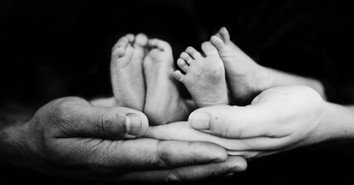Studies show that people who forgive are happier and healthier than those who hold resentments. The first study to look at how forgiveness improves physical health discovered that when people think about forgiving an offender it leads to improved cardiovascular and nervous systems. Another study at the University of Wisconsin found that the more forgiving people were, the less they suffered from a wide range of illnesses.
Remarkably, we humans put forgiveness--the ability to halt resentment, indignation or anger due to a real or perceived offense, or ceasing to demand punishment for such an offense--up there as not just a want, but a need. Problem is, we often don't know how to get there, and we know it. As proof, the Gallup Organization discovered that 94% said it was important to forgive others, but 85% said they need some outside help, including divine help, to obtain it, similar to the way that people who want to lose weight hire a personal trainer--they don't believe they can get there on their own.
Even more remarkable was how people admitted that regular prayer didn't help them forgive. What truly helped them was meditative prayer, the kind that Martin Luther King committed himself to, not just to help him forgive those who harmed him and his beloved family, but also those who were committed to harming the people he longed to liberate.
Instead of thinking in terms of burying a hatchet, those of us who have been bullied should think in terms of burying the poison. Because un-forgiveness is like drinking poison ourselves and expecting our Bully to die. Thankfully, forgiveness exists in two flavors, like scoops of ice cream on a cone: Decisional, where your mind leads instead of negative emotions, and you choose how you intend to act or would act if you had the chance; and emotional forgiveness, the emotional replacement of negative, unforgiving emotions with positive, other-oriented emotions.
Emotional forgiveness is superior, more difficult, but not required for good health and right standing with God. In the New Testament, we see that God desires us to emotionally forgive because God loves us and wants us to be free from the snares of our oppressors, but He does not require emotional forgiveness. For many, this is a refreshing drink of soul water.
And forgiving another does not mean that the Target must reconcile with his or her Bully. "Reconciliation is resurrecting trust," writes Everett Worthington Jr., Ph.D. a former executive director of the Templeton Foundation's "A Campaign for Forgiveness Research." "Reconciliation," he writes, "depends on whether people believe that each will act trustworthy and not re-injure each other."
What would have helped Moss avoid this decades-long nightmare? If the countless Bystanders who witnessed his torment did the right thing, the heroic thing, and intervened. As the numerous letters to our organization attest, many such witnesses as adults harbor great regret and self-recrimination to this day. They are unable to live with themselves for having succumbed to such dark peer pressure, or as today's youth put it, how they became the Bully's "tool." They lament their cowardice, their indifference and their unwillingness to do the right thing afraid and help Moss and others like him. They know, though they often cannot fully explain, that such timidity in the face of blatant injustice and cruelty stole a part of themselves, the better part. It's well past time to cultivate and celebrate the morally courageous among us. It's time to cultivate and celebrate such heroes. They're out there--they just need some tools, some inspiration, and a sense of responsibility that he ain't heavy, he's just like me.
For a quick but powerful beginning step in this life-changing process, read Everett L. Worthington Jr.'s small, 31-page booklet, "How Do I Forgive?" [IVP Books].






